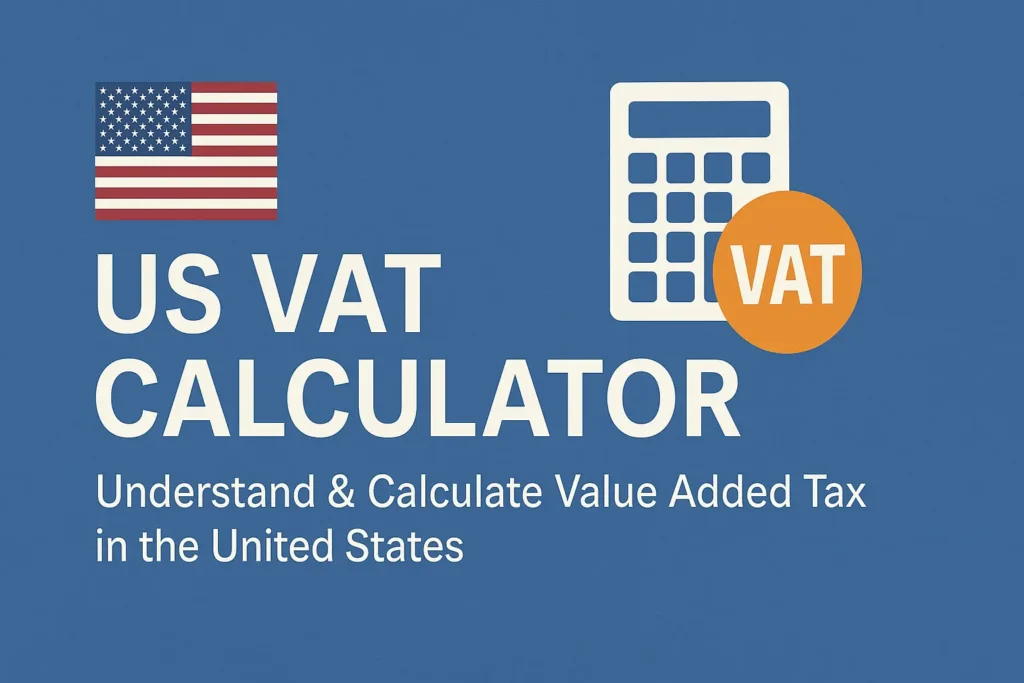US Sales Tax Calculator
Results
Note: This calculator provides estimates based on general state rates. Actual rates may vary by city/county and are subject to change. Some items may qualify for exemptions not reflected here.
🇺🇸 US VAT Calculator – Understand & Calculate Value Added Tax in the United States
In a world where digital commerce is global, businesses and consumers often encounter the term VAT (Value Added Tax). But in the United States, things get tricky. The U.S. doesn’t traditionally impose a national VAT system like the EU or many other countries. However, that doesn’t mean American businesses are off the hook when it comes to understanding sales tax, use tax, or the implications of VAT when dealing with international trade.
This guide breaks it all down. Whether you’re an eCommerce entrepreneur, digital service provider, Amazon seller, or accountant, this article offers a complete understanding of VAT in the U.S. context, and gives you the tools to calculate VAT correctly for cross-border deals.
📌 What Is VAT?
VAT (Value Added Tax) is a consumption-based tax charged on goods and services at each stage of production or distribution. Unlike sales tax, which is applied once at the final retail point, VAT is collected at every transaction along the supply chain.
For example:
A manufacturer pays VAT on raw materials.
The wholesaler pays VAT when buying from the manufacturer.
The retailer pays VAT when buying from the wholesaler.
The final consumer pays VAT at purchase.
In countries with VAT, businesses collect it, offset what they already paid (called input VAT), and remit the balance to the government.
🇺🇸 Does the United States Have VAT?
No, the United States does not have a federal VAT system. Instead, the U.S. uses sales tax, which is:
Imposed at the state and local level (not federally).
Only charged at the final point of sale.
Not typically reclaimable by businesses.
However, VAT still affects U.S. businesses in several important cases:
Selling to foreign countries with VAT (e.g., EU, UK, Canada).
Registering for VAT abroad to comply with local laws.
Importing goods from countries that charge VAT.
Understanding reverse charge VAT on B2B services.
🤔 So Why Create a US VAT Calculator?
Because American businesses often need to:
Calculate VAT inclusive and exclusive prices when selling overseas.
Determine whether they need to register for VAT in EU/UK.
Show VAT breakdowns for international customers.
Estimate input VAT vs. output VAT for global invoicing.
🧮 How Does a US VAT Calculator Work?
A US VAT calculator helps calculate:
Price including VAT
Price excluding VAT
VAT amount
✅ Input Fields:
VAT Rate (%) – 5%, 10%, 20% etc.
Net Price – Base price before tax
Gross Price – Price including tax
✅ Output:
VAT amount
Final price (inc. or exc. VAT)
🔁 VAT Calculation Formulas
1. Calculate VAT Amount from Net Price
VAT = Net Price × (VAT Rate / 100)
Example:
Net Price = $100
VAT Rate = 20%
VAT = $100 × 0.20 = $20
Gross Price = $120
2. Calculate Net Price from Gross Price
Net Price = Gross Price / (1 + VAT Rate/100)
Example:
Gross Price = $120
VAT Rate = 20%
Net Price = $120 / 1.20 = $100
VAT = $20
🌍 When U.S. Companies Need to Understand VAT
🔹 1. Selling to Europe
If you sell digital services, SaaS, or goods to EU customers, you may be required to:
Register for VAT in that country.
Charge the local VAT rate.
File VAT returns.
Example: If you’re a US-based app developer selling to German users, you must charge 19% German VAT.
🔹 2. Selling on Amazon Europe
If you use Amazon FBA in the UK, Germany, France, etc., Amazon may require you to register for VAT in those countries.
🔹 3. Dropshipping and VAT
Many US dropshippers source products from China to Europe. Even though you’re in the US, VAT is triggered when goods enter the EU. You may need to:
Register for IOSS (Import One-Stop Shop).
Include VAT in your prices.
🔹 4. Reverse Charge for B2B Services
If you’re a US company receiving B2B services from an EU vendor, you may need to self-account for VAT using the reverse charge mechanism.
⚠️ Common Mistakes in US VAT Handling
Assuming VAT doesn’t apply to you – It often does, especially in SaaS, eCommerce, or affiliate marketing.
Not including VAT breakdowns in international invoices.
Charging incorrect VAT rates to EU customers.
Ignoring VAT refund opportunities.
Forgetting thresholds for VAT registration abroad.
💼 US Businesses That May Need a VAT Calculator
| Business Type | VAT Use Case |
|---|---|
| eCommerce Sellers | Selling goods to EU/UK |
| SaaS / Digital Goods | Selling software, e-books, etc. |
| Amazon FBA Sellers | Storing goods in Europe |
| Freelancers/Agencies | Invoicing EU clients |
| Coaches & Creators | Selling courses overseas |
| Importers | VAT on goods entering EU |
🧩 Understanding VAT in Global Platforms
🔹 Amazon
Often handles VAT on behalf of sellers.
Can auto-collect and remit VAT in certain jurisdictions.
🔹 Shopify
Lets you set VAT-inclusive or VAT-exclusive pricing.
VAT rules depend on store location and customer address.
🔹 Stripe & PayPal
Integrate VAT handling based on user location.
Support MOSS (Mini One Stop Shop) and IOSS for VAT reporting.
🧾 Sample VAT Invoice Format for US Business
INVOICE
Vendor: Acme Inc. (USA)
Customer: XYZ Ltd (UK)Product: Software License
Net Price: $100
VAT (20%): $20
Total: $120VAT ID: GB123456789
✅ Always include the buyer’s and seller’s tax IDs for B2B sales across borders.
🔐 Do US Citizens Pay VAT When Traveling?
Yes. While the U.S. doesn’t charge VAT, travelers pay VAT in other countries when buying goods or services locally.
🧳 Tip: Some countries allow you to reclaim VAT at the airport for goods exported home.
📈 Future of VAT in the U.S.
Although the U.S. currently uses a state-based sales tax system, discussions about federal VAT have occurred as part of tax reform ideas. It’s unlikely in the short term but may arise in the future as digital taxation grows globally.


